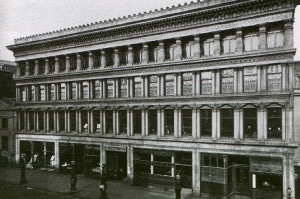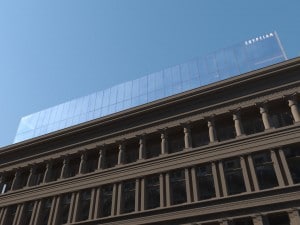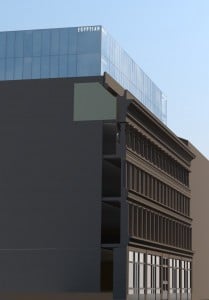 Last night’s 2015 RTPI Scotland Sir Patrick Geddes Commemorative Lecture was presented by Wulf Daseking, Professor at the University of Freiburg’s Institute of Sociology. It was an inspiring talk but also a frustrating one.
Last night’s 2015 RTPI Scotland Sir Patrick Geddes Commemorative Lecture was presented by Wulf Daseking, Professor at the University of Freiburg’s Institute of Sociology. It was an inspiring talk but also a frustrating one.
Freiburg is an excellent example of a town which has sought to create the best possible urban living conditions for its people. Along with Copenhagen, it’s as good a benchmark as any to be found in Europe.
It’s success in delivering sustainable urban living is built on a clear vision, a focus on delivery and an ambition to put people before private cars. Average car ownership in both Germany and the UK ranges from 550-700 cars per 1000 people. The latest Freiburg neighbourhood development has brought this down to 85 cars per 1000 people by offering easy access to homes, work and leisure on foot, bike and by public transport.
The real key to success has been a willingness to wrestle with fundamental questions, embrace honest answers and face the often challenging consequences. For example, promoting renewable energy solutions as an alternative to Germany’s nuclear power plans during the early-1970s oil crisis was a controversial and prophetic step. To a large extent it set Freiburg on its unique path towards a sustainable future.
Many people present at the talk would have been asking themselves why we haven’t already followed this path ourselves and how we might now do so. Without wishing to put a damper on the positive message, there are a number of factors which make it difficult to follow Freiburg’s example.
For one thing, energy policy is fundamental to sustainability. It’s reserved to Westminster, so beyond Scottish Government control. Recent policy changes undermine renewable energy and turn us back towards an over-subsidised reliance on nuclear power. Energy provision is a fundamental question we are unable to answer. Too many other questions relating to welfare, poverty and inequality are also unanswerable at present.
At the local authority level we are challenged by scale, with our administrative boundaries covering diverse areas far larger than our European neighbours. Smaller, locally-focused administrations could be transformational in terms of place quality. It can’t be done? Well, the rest of the continent seems to manage it just fine. Having said that, some of our urban-centred local authorities ought to be able to deliver a stronger vision: Edinburgh could do much better; Dundee is probably as good as we have.
For any of this to succeed, we’ll need to rebalance public and private delivery. We rely too heavily on the private sector to deliver social benefit, hoping (without much of an evidence base) that commercial considerations will be tempered, as egalitarian developers build a utopia. It’s not happening and no amount of s75 legal agreements can change that. Don’t blame the private sector – it’s only doing its job.
In response, Freiburg has reasserted delivery by public agency. Controls on land values (and by implication land supply) have made it possible for public authorities to service land and provide high quality public realm, open space and facilities which meet the needs and aspirations of its population. The cost of providing land for development with physical and social infrastructure already in place is reflected in the price developers pay for sites. The size of land parcels sold is restricted to ensure variety in design – and it enables a large number of often locally-owned companies to survive in the market, rather than just a handful of huge shareholder-owned companies.
We already have the powers to do this in Scotland. We’ve been talking about doing it for years. Yet the housing crisis continues to grow and place quality remains as another unanswered question.
With the exception of Dundee Waterfront, there are few examples of this kind of action in Scotland. A lack of knowledge, skills and experience may be partly to blame. If so, let’s roll out the Dundee model elsewhere. Let’s not wait another 5, 10 or 20 years.
One final point to note is that we shouldn’t simply blame planners and local authorities for a lack of progress. There’s undoubtedly a need for leadership and vision and both have a key role in providing this. However, the fundamental change we need can’t simply be enacted on behalf of society with its implied support. We need a fully engaged population which raises its sights and quickly turns baby steps into giant strides. That brings us back to fundamental questions, honest answers and the need to confront challenges. A few exemplary planning projects isn’t going to be enough.



